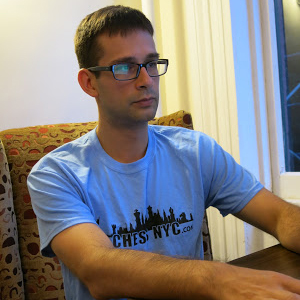11/22/2005
Interview with League MVP - Pascal Charbonneau
---------------------------------------------
by Evan Rosenberg
--------------------------------------------

International master Pascal Charbonneau competed very
successfully as the first board for the Baltimore Kingfishers in the
inaugural season of the US Chess League. He participated in all but one
match, and in every game he played decisively, only drawing GM Alex
Stripunsky on two occasions (in one of their contests Pascal conceded a
draw in a much better position to ensure a victory for his team).
Pascal is no
stranger to team competitions, representing UMBC in collegiate
championship events and accepting first board responsibilities in US
Amateur Team
competition. With the impending finals approaching (not only for the
chess league, but more significantly in academic terms) Pascal agreed
to impart some of his opinions about the league, his individual games,
and how to prepare for critical situations over the chessboard.
Pascal was generally impressed with the US
Chess
League. "I think it was a success. It was a lot of fun and I was happy
to be competing." He believes in the future of the league, but admits
that "it would be nice to get sponsorship eventually." With the issue
of sponsorship introduced, it becomes clear that financial restraints
would significantly affect the league. "Average rating would become an
issue if you can afford to pay more strong players." Hopefully, the
popularity of the league will attract the interest of sponsors, and
increase the geographic distribution of the teams.
When the league commenced in August, Pascal
was
ambitious, but apprehensive about making any bold predictions. "To be
honest, I wasn't sure how our team would do, or which team would work
better." Pascal acknowledged the stronger lineups of some of the other
teams, and their potential to be more competitive. Baltimore would have
to rely on veteran consistency. "We have solid players. They all have
experience and get good results." Playing as a member of a team
requires you to re prioritize the importance of your individual result.
"You have to put the team result in perspective. I tried to do exactly
what my team needed me to do, and I was really watching the other
boards." The Kingfishers all convened in a computer lab for their
matches, and each participant had independent access to a computer (as
opposed to New York for example, who played on actual chessboards and
relayed moves to a single computer). It is interesting to consider the
difference between the tangibility of a three-dimensional chess set and
the superficial quality of a two-dimensional chess board. Pascal had
grown accustomed to using ICC as a medium for his games, but "for a lot
of people it makes a difference."
After losing the initial match, and drawing
the
second match on the verge of defeat, Baltimore started the season at a
sluggish pace. However, with four consecutive victories in weeks three
through six, and two critical victories in the penultimate and final
matches, Baltimore was riding high on momentum as they approached their
playoff match with New York. As to their chances, Pascal candidly
responded that he was "not so confident, draw odds offer a huge
advantage." However, Pascal had faith in the team, and he was
convinced that Baltimore had assembled "a perfect lineup to try and
play for a win."
Pascal had clashed with GM Stripunsky on
many
occasions subsequent to their semi-final contest. In their two previous
league matches, they had played exciting and unpredictable chess,
entering
many complicated positions. Each time the game ended peacefully, but
not for lack of bloodshed. Their playoff match would be no exception.
"I
played an inaccurate opening, but later on I was not much worse. Even
though we lost on board two, after I saw the last two boards I became
confident at some point. I transposed into a drawish endgame once the
position looked suspicious." Baltimore controversially elected to play
with the black pieces on boards one and three, but this was a well
calculated decision. "Stripunsky doesn't really play sharp stuff with
White, so I wasn't afraid to play with Black. Besides, we felt it would
benefit the team to have white on boards two and four." Baltimore
defied the odds and defeated New York 2.5-1.5.
Pascal's opponent for the finals is GM
Julio Becerra.
In their first meeting this season, Pascal played from the black side
of a very theoretical variation of the Sicilian Dragon, and the sharp
consequences favored Becerra who was able to convert the full point.
With the first move, Pascal is determined to steer this game in a more
favorable direction, however this most likely will not be the result of
excessive preparation. "I've been writing a lot of papers, the fact is
I'm a student." The dilemma of the scholar-athlete is emphasized by
Pascal who demands a lot from himself both academically and in
competitive chess. But Pascal excels in positions that require creative
intuition over rote theoretical memorization. Additionally, Pascal
feeds off of Miami's flagrant attitude towards the match. "Miami is
very confident, and that should serve to motivate us."
As a result of his appetite for full points,
Pascal
accumulated enough wins to receive the league MVP award. While Pascal
is certainly honored by the accolade, it won't distract him from the
task at hand, nor will it inflate his ego. Instead, Pascal approaches
the match with a level head, and recollects fondly on the season that
culminates on Wednesday with the finals. "It was definitely fun for
everyone. The season had its ups and downs, and at times we were sort
of inconsistent. But we showed something to get the best of New York,
and we're ready for the finals."
Click here to go back to
the US Chess League
homepage
